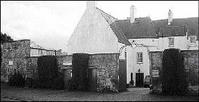Earl Moxam, Senior Gleaner Writer
Inveresk Lodge in Glasgow, Scotland. - Photo by Mike Wilkinson
It's a beautiful, peaceful afternoon with hardly a human sound in evidence. The bluster of the cold wind tugging at our coats is the only interference as we stand there outside historic Inveresk Lodge, on the outskirts of Edinburgh.
My guide, Professor Geoff Palmer, and I, two Jamaicans of mixed heritage, walk freely through the gate and into the front yard and then on into the garden of this ancient place, anxious to relive a significant piece of Jamaican and Scottish history.
The aged iron-wrought gate leading into the garden squeaks loudly, bringing echoes of a distant past, when the likes of these two inquisitive Jamaicans would not have been welcome.
Turned away
How different from that fateful day when Robert Wedderburn, fresh from Jamaica, appeared at the door to greet his father, only to be turned away, rejected and scorned.
This was not the right place for the boy, born of the slave woman, Rosanna, and James Wedderburn, the white plantation owner in Westmoreland, Jamaica. He would only serve to embarrass the family which had painstakingly rebuilt its reputation and standing in society.
It was in 1762 that James Wedderburn fathered Robert with the slave woman. He reportedly sold her while she was pregnant, but on condition that the child should not be enslaved as well. That gift of freedom was intended to be his only bequest to this bastard son of mixed race.
Shortly after, James and his brother, John, returned to Scotland. John brought back with him the slave, Joseph Knight, from Jamaica, who subsequently ran away. The Joseph Knight case made Scottish legal history in 1775 when the Court of Session upheld a lower court ruling, granting Knight his freedom and affirming that slavery was not permitted in Scotland.
James, in the meantime, had acquired Inveresk Lodge in Musselburgh, where he set up himself and his family, including a 'legitimate' son, Andrew, in fine style.
In a sense, the Wedderburn family had come full circle. James' father, Sir John Wedderburn, had been a highly respectable member of British society, until he joined the Jacobite rebellion against the English in 1745. After the defeat of the rebels at Culloden, he was captured and on November 28, 1746, met a gruesome death - hanged, decapitated and disemboweled.
Immense setback
It was in the wake of that immense setback for the Wedderburn family that Sir John's sons had fled to Jamaica to seek their fortunes. Now they were back and they were not about to accept the family name being besmirched again by this 'intruder'.
So James refused to greet his mulatto son; instead, he dispatched his butler to the door to send him away with "a cracked sixpence" and "a glass of small beer", as Robert himself described the encounter. He was told to go his way and never darken the doorway of his father's house again. He made his way to London where he joined the abolitionist movement.
Robert was imprisoned on three occasions for his activities as an abolitionist and as a Unitarian minister. In one of those incidents, he was charged with sedition and blasphemy for arguing that a slave had the right to kill his master.
This colourful and defiant life came to an end when Robert died in Dorchester prison in the 1830s.

